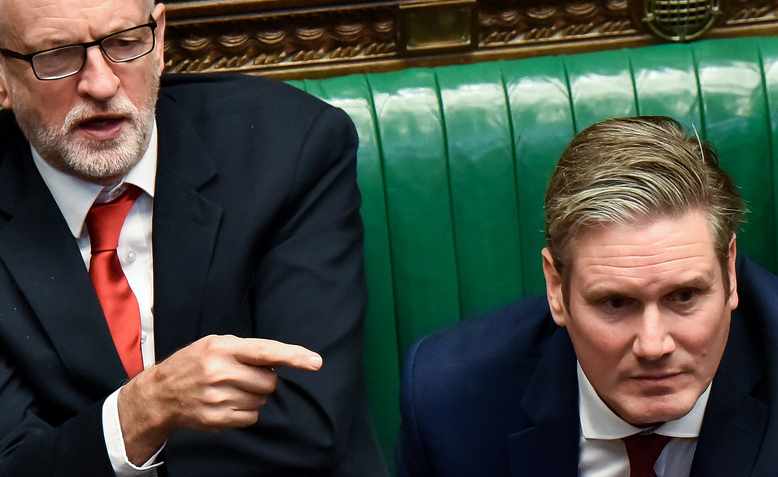In July 2024, Starmer had an opportunity to stand at the despatch box and usher in an age of thrusting forward thinking, singing a revolutionary hum, however his first phase was whittled into a masticating, obedient hue of “securonomics” and soft austerity.
It is from this meek, hawkish economic program that the popular notion arises from critics that Starmer is a capital-c Conservative merely cosplaying as a Labour Prime Minister, playing a sinister trick on the nation in crimson drag.
Barely one month into this new Parliament, seven MPs were suspended by the administration for supporting an amendment to scrap the two-child benefit cap.
Later, in July 2025, Starmer removed the Labour whip from four backbenchers for “persistent breaches of party discipline.” Audrey White, a Labour activist, was expelled in 2022 after confronting Starmer during a visit to Liverpool.
She criticised his perceived right-wing policies and his association with the Sun newspaper. In July 2021, the Labour Party’s National Executive Committee voted to ban four left-wing factions—Resist, Labour Against the Witchhunt, the Labour in Exile Network, and Socialist Appeal—citing their incompatibility with the party’s rules and values.
Former Labour MPs, Sultana and Corbyn (both of whom fell to the blade of Starmer’s scalpel of docility) vowed to carry the flame of socialism that many on the left believed Starmer had smothered for capital-coddling moderates through this authoritarian clampdown.
Earlier this summer, they announced the formation of a breakaway left wing party which was supposed to embrace a new resurgent leftist renaissance with all of the Militant Tendency zeal to make Bevan himself blush.
And yet, just two months later, the party has been beset with internal division, factionalism and ideological chaos. Corbyn and Sultana initially clashed over the announcement of the party, which Corbyn stated he did not authorise.
Regarded as a blip, however, they soon joined hands in the public limelight, united again to stare down the spectre of Neo-fascism they believe to be haunting Britain.
Adnan Hussain burnt bridges from his left and right by admitting his ambiguous socially conservative views, amidst the hellish nightmare which has proven to be the confusion regarding something so simple as the party’s name – which is yet to be decided via public vote.
Perhaps now the public may fittingly choose “Piss Up in a Brewery Party”, of which they seemingly could not organise.
This week’s episode of Your Party catastrophe rests with Sultana’s unilateral launch of a paid membership portal, which she claims drew 20,000 sign-ups and raised £1.1 million.
Corbyn condemned the move as unauthorised, called for supporters to cancel payments, and flagged potential legal issues with the ICO. In turn, Sultana accused Corbyn of sidelining her in decision-making, labeling his faction a “sexist boys’ club”.
The public feud has cast perpetual doubt on the party’s unity and future direction. The spectacle of Corbyn and Sultana’s party – which was hoped to be a robust fortress against a perceived surrounding horde of distinctly unsympathetic rivals – over decisions as trivial as a membership portal signals serious alarm bells in a party barely even in formal assembly.
The reality, of course, was that this week’s mortifying online circus was rather the final hammer on the coffin already cladded in scandal-laced nails.
So where now? The party that vowed to be the last keeper of the flame of British socialism has caught alight, and the Labour Party withering from the sclerosis of Starmer’s managerial straightjacket.
Andy Burnham’s condemnation of Starmer’s expulsions and plea to reinstate the party’s pluralist pneuma perhaps gives us the first clue as to where we go from here.
Former New Statesman’s Spotlight section associate editor and recently appointed UnHerd contributing editor, Jonny Ball, expertly prophesied that an almost inevitable split in the Corbyn-Sultana project would leave the Greens as the only suitable home for a Left abandoned and besieged by what they believe to be a Labour administration increasingly cozying up with Trump, betraying the labour movement with welfare cuts and a Welfare Bill which is reported to push approximately 150,000 into poverty by 2030.
But the pacifistic, docile Greens in all of their Kumbaya cadence and ethically sourced tote bags just don’t seem to emanate a message of radical reform so patiently awaited. Thus, the teasing promise of Andy Burnham challenging for leadership this week starts to feel more like the last chopper out of Saigon.
Labour has never been a monolithic party. From its earliest inception, it has been less a single ideology than a coalition of traditions – Fabian intellectuals arguing for gradual reform, trade unionists rooted in workplace struggles, Christian socialists carrying a moral critique of capitalism, and later the competing wings of Bevanites, Bennites, and Blairites.
The party’s greatest victories came when it leaned into this pluralism rather than tried to stamp it out. In 1945, Clement Attlee’s government was the product of a fragile but effective alliance between different currents on the left: some wanted sweeping nationalisation, others more moderate welfare reforms.
What made Labour strong was not the dominance of one vision, but the ability to weld them into a single programme that could command majority support.
Since Jeremy Corbyn perennially fought off slanderous lambasts from the media in the Red Scare fashion of Vietnam-era America, it has served as a folktale lesson on socialist over-reach; a cautionary tale on how Labour ought to remain a docile, middle-of-the-road entity, ever-mindful of the establishment’s gaze.
Tony Benn once said that “if the Labour Party could be bullied into denouncing its Marxists, the media – having tasted blood – would demand next that it expel all of its socialists to form a harmless alternative to the Tories, which would be allowed to take office now and again when the Conservatives fell out of favour with the British public and thus British capitalism would survive.”
An almost Biblical prophecy, his words have been borne out over the past year. The Daily Mail etched its existential dread of a Starmer ascendancy as a looming “one party socialist state” in the soon to be inevitable case of a “Tory wipeout”.
Perhaps Benn would chuckle a vindicating laugh as he triumphantly puffed on his pipe after seeing Starmer initiate a 400+ seat majority government by ramming through welfare cuts and axing anyone who dared to ask “is this what Labour is about?”
But the Labour’s plutocrat metamorphosis long predates Starmer. In a similar article, Ball emphasised that Blair and Brown “acquiesced to the political economy of Thatcherism.”
Thatcher, of course, once crowned Blair as her proudest lovechild; that his ascension marked the end of the hopeful trope that donning a red rosette automatically marked a socialist future, and the sounding of the requiem bells which signalled Labour’s official surrender to the neo-liberal settlement.
By the time Blair had scrapped Clause IV of the party’s constitution, the transformation was complete. Since 1918, Clause IV had pledged Labour to the “common ownership of the means of production, distribution and exchange.”
In practice, the party had long moved away from sweeping nationalisation, but the clause remained as a moral anchor — a reminder that Labour was, at root, a socialist party committed to collective solutions over private profit. Blair saw it differently.
To him, Clause IV was a relic; a millstone that tied Labour to an unshakeable image of unelectable dogmatism. Removing it was intended as a symbolic act of renewal, signalling to business, the media, and middle England that New Labour was not beholden to old orthodoxies.
Although the clause had long ceased to dictate policy, it symbolised an unbroken thread of purpose, that Labour was more than the stewards of capitalism – it was a movement with a soul.
When The Beatles broke up in 1970, a CBS news team lamented it as ‘the end of the British Empire’ – as if the end of this Dionysian, vigorous era of mischievous cultural rebellion was synonymous with the final curtains on Britain’s crown as global pacesetters.
Perhaps the same can be said for this unedifying car-crash of the Sultana and Corbyn fall-out. Although the party seemingly exists as a prospective project, it has severed the essence of hopeful and defiant radicalism – now utterly eschewed by bureaucratic miscommunication and factional infighting.
It is impossible to attribute the reasons for people fleeing the Labour Party in an exodus for the Greens, or for the prophesied revolutionary zest of Your Party to a single attribute.
The allegation that Kier Starmer has clipped the wings of the once “united we stand” marching spirit of the labour movement – or that socialists no longer have a home outside of the cleansed margins of this perceived Third Way revivalism, are two to name.
Perhaps my Labour isn’t a Keir Starmer kind of Labour, certainly not a “we’re alright!” kind of Labour, yet who’s to say his is the true type?
Who’s to say there is a true type? Sure, I’m more Tony Benn than Tony Blair, more Jeremy Corbyn than Peter Hain, more Karl Marx than Crosland, more 1911 Transport Strike than Portillo moment – my Labour has room for all of the above.
Ultimately, now, the lesson is twofold. We’re now faced with a Labour Party deracinated from its original ideological anchor, and in turn, a ‘Your Party’ who have only proven the fragility and consequences of a movement in the absence of that shared covenant.
The Labour Party can still be a promising vessel of economic justice, of hope, of a return to its collective purpose – and most importantly, a vigorous network of voices, robust precisely because it can harbour disagreement without fracture.
And thus, it must be a Labour Party capable of leading the working class while coalescing every sympathetic current, every faction, every progressive strand behind its banner – the banner of socialism.
Featured image via House of Commons.


